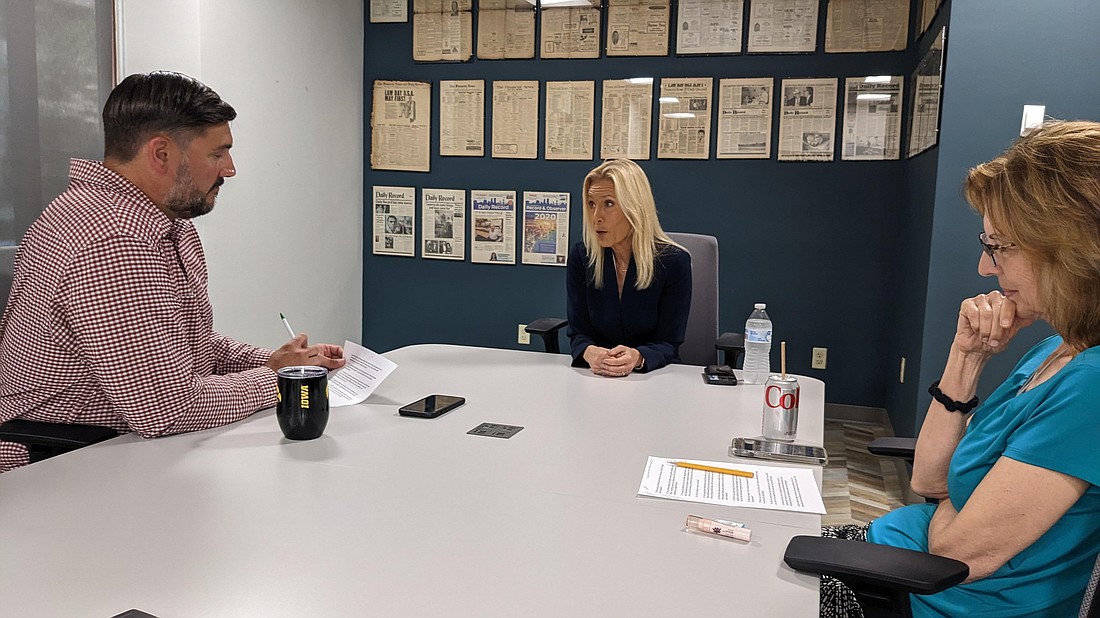
In the final two weeks before the city’s May 16 runoff election, the Jacksonville Daily Record invited mayoral candidates Daniel Davis and Donna Deegan to participate in a policy conversation with the newspaper’s editorial team.
The following is a transcript of a 36-minute interview May 11 with Deegan at the Daily Record office in Downtown Jacksonville.
The Donna Foundation founder and former First Coast News anchor discussed what she sees as a need to return transparency to City Hall, as well as her priorities for improving the city’s infrastructure; pushing for more federal grant revenue to fund projects; and how she will work with Jacksonville developers and small businesses.
Deegan, a Democrat, also outlined how she would navigate hyperpartisanship in city government and any intervention from Gov. Ron DeSantis and Tallahassee in Jacksonville’s home rule.
The Daily Record conducted a Q&A on May 3 with Davis that can be found here.
Q: What will be the policy priorities that would define the first year of a Donna Deegan administration?
A: Well, I think the very first thing that we need to focus on is transparency. I think we need to get in there and open up the blinds and let the sunshine in. There has been really a transparency issue at City Hall. And so, that, before we tackle anything else, has to be it. We’re going to bring in a lot of new board members, we’re going to diversify those boards to make sure they’re very representative of Jacksonville to bring in different viewpoints from what we have now and change the way we do business.
Q: When you say diversify boards, are there any specific boards or commissions that you are looking at that you think need to have more diversity or new members?
A: I think all the boards need to be diversified, but I think (the) Planning (Commission) would probably be one of those that I think is really important, but I really just think we needed to take a look at how all the boards are populated. Not just trying to get rid of people to get rid of them, but I do think it’s very, very important not to have the same people who have sort of run the same ruts over and over again. We need new viewpoints. We need some fresh eyes.
In terms of policy, I have a three-pillared plan for Jacksonville. It starts with infrastructure. I know that sounds sort of boring, but at the end of the day, I don’t think there’s anything more important to move us forward both Downtown and in our neglected neighborhoods and in some of our most vulnerable neighborhoods to flooding than infrastructure.
So, first priority is to make sure that we are taking a look at those neighborhoods where we have had so much neglect. I mean, we live on the water. We live on the river. We live on the ocean. We live on what’s, basically, swampland. And we’ve got so many structures, bridges, sidewalks, drainage, all those things that are just falling into the water and deteriorating.
So that’s really, really important. We’ve got neighborhoods that we have been really promising things to since the time of consolidation, and it’s time to get in there and actually get those things done.
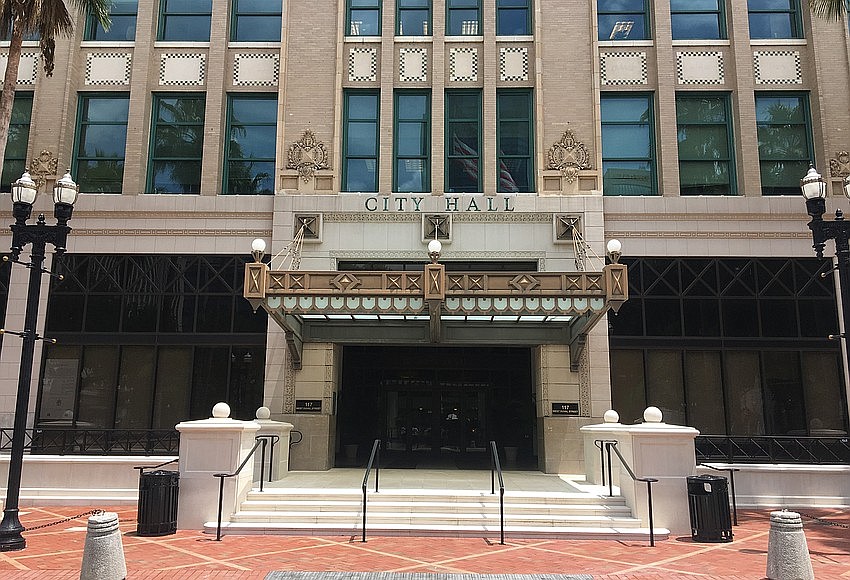
We need to meaningfully look at septic tank removal. We set aside money for that a couple of years ago and every year we’ve taken a little bit of it back since then. And we need to make sure that we are very intentionally getting rid of those septic tanks, especially the ones that are leaking into the river. Because that’s causing us health problems and it’s also causing our river problems. So infrastructure is very big. All of these things, I think, play a big part in economic development. Because if we can have the proper infrastructure, I think that we won’t have to give away as many incentive dollars in our Downtown.
The second thing would be health care. We have the best health care in the country in Jacksonville with the Mayo Clinic and with MD Anderson and wonderful doctors and nurses and hospitals. And yet we have the worst health outcomes in the state of Florida. Our maternal mortality rate (and) our infant mortality rate are at the bottom of the bottom. And then our measures of primary health, obesity, heart disease, all those things that you measure for primary health, we rank near the bottom in the state and some of the worst in the country.
About a year and a half ago, I got together with a group of public health physicians, Jeffrey Goldhagen (UF Health Jacksonville), Rogers Cain (Baptist Health), Sunil Joshi (Baptist Health) and a whole host of others, and nurses and other people on the front lines of health care every day — those people that actually serve patients — and I said, ‘What can we do that we are not doing?’
I mean, within reason, right? Because you can’t do anything that’s going to cost a lot of money and you can’t do anything that you don’t have jurisdiction to do. They said what we need more than anything else, is to create a Chief Health Officer position that is a public health physician. Because 20 years ago, we took our public health dollars and we basically centralized all of that to the state of Florida. So, we’ve lost tens of millions of dollars in public health dollars. So it’s very important to have that public health position.
Then, what we’re going to do, and this is going to be something I’m going to do in the entire administration, we are very intentionally going to go bring down more federal and state grant dollars than we do right now.
We’re going to make sure that we work with our very fine nonprofits so our public-private partnerships are going to be very, very important. Make sure that we are taking a look at where all that care is provided. Drawdown some more dollars for that but also put some accountability measures in place so we can see what’s working and what isn’t working.
And then create an educational component. So much of what my plans entail for the city really are things that we need to educate our population about. If something is a priority, you want people to know about it. And so we’ll create an education component.
And just on a personal level, I will continue to advocate for Medicaid expansion in the state of Florida. That’s obviously that’s not something I will have any control over, but that’s one of the reasons our hospitals are in such poor shape. We’re bankrupting our hospitals because we’re one of only nine states that doesn’t care for our medically needy and that’s a really important thing. But nothing I can do about that. So, that’s the framework for that.
And then the third thing for me is economic development, specifically focusing on small business. I love big business. I love when we can bring big companies to Jacksonville. It’s fantastic. The truth is, big companies account for 20% of the economy and small business accounts for 80% of the economy. If we can really fire those engines of small business we will have the opportunity to really, really grow our economy in a big way.
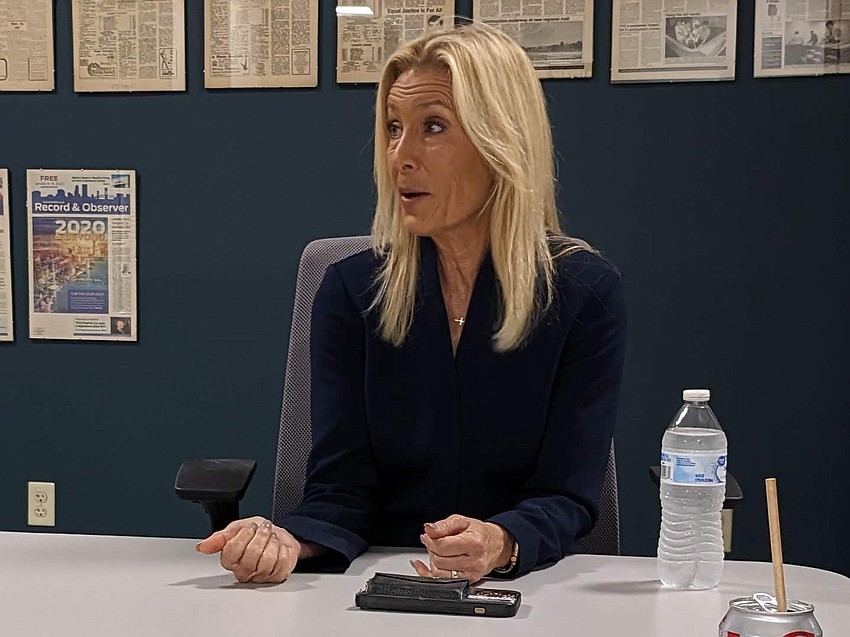
So what does that look like? To me, we have to make sure that we’re reaching back out to our small business community. I’ve heard over and over again, in fact, I met with a gentleman at a meeting I had last night who made a beeline for me and said “You know, I have waited 18 months and I still haven’t got my permits for to renovate and renovate my small business.” He’s frustrated and he’s losing money. Time is money when it comes to businesses, right?
So, we have to really fix a broken permitting process. That’s one thing we have to do.
But then I want to create levers for small businesses. You know, the Small Business Administration is something that people have been connected to through UNF (University of North Florida), which is fantastic. But let’s make that available through other resources. That’s a great way to help people start and grow businesses.
And then I’d love to bring Junior Achievement back to our classrooms. A way to get kids engaged early in the knowledge of how to market, grow and build a business. I really think if we focus on this very intentionally and then bring in some tools, connect people to things like facade grants and incubator programs, those things and some of the tools that are available to grow small businesses. I think we could have a real renaissance of that in our city.
Then, beyond that focus on our younger population. I know they’re very excited about artificial intelligence and the new technologies of the future to bring more educational opportunities for those things and more job opportunities for those.
I’d love to see us focus more on our spaceport. Those are all things that I think would be real fires for our economy.
Q: You touched on several things we wanted to talk about. We want to go a little deeper. This would be your first time holding elected office. Who do you intend to appoint to key leadership roles in the city such as chief administrative officer, chief of staff or chief financial officer? Do you intend to keep anybody from the current administration?
A: Well, I think you probably know as well as I do that I’m not really allowed to talk about those things yet. I’m not allowed to ask people yet, and I’m not allowed to really put that out there. So I won’t do that.
I will tell you that I am casting a wide net and talking to a lot of people that I trust. I have a great team around me to bring in the very best people to run this city. And that’s what we’ll do. I think great leadership is about first of all, casting a vision and then putting the right people on the bus to bring that vision in for a landing. And having the communication skills to communicate that vision and to listen to the public and bring them in. I’ve done that before in my life and what I’ve built, and I have every confidence I can do that again.
In terms of making replacements, I’ll keep people who are working. I’ve got to go in and make an evaluation. If a department is working well, there’s no reason to change it. If it is not, then we will need to make changes. But, as I sort of indicated earlier, I think accountability is key.
We have really had a difficult time with accountability in this city. We don’t have any metrics in place, and I don’t know how you run a business effectively without having data to say this is working (or) this is not working. The only way you do that is if you’re handing out, you know, a grant or something to a process you need to go in and evaluate that to see if there is a return on that investment.
Q: Do you stick with talent that’s currently here in Jacksonville for your department heads and your leadership, or do you go more broadly outside of Northeast Florida?
A: I’m not going to limit myself. I’m going to bring in the best people for the job.
Q: You talked about changing the tenor of City Hall. If elected, you’d be replacing a two-term Republican mayor. What wholesale changes can voters expect to see in City Hall leadership under your administration in addition to the transparency you’re already discussed?
A: Well, I think it’s really, really important to bring everybody in. I think we have lived in a season of really high hyperpartisanship and Jacksonville didn’t used to be that way. I remember having a conversation with former Mayor (John) Delaney recently and I said, ‘I can honestly tell you, I don’t remember when we elected you as mayor, I don’t remember whether you were a Democrat or Republican.’ It wasn’t anything that actually came to my mind. It was, oh, this is a good plan for the city.
And so I think we need to get back to that sort of mentality. So, a Donna Deegan administration will have Democrats, Republicans and independents in it. We are going to very intentionally bring everybody in, because I think otherwise what you’re looking at is a supermajority of one party. And already we see the perils of that.
We see a lot of special deals, we see a lot of, frankly, the same ruts that we’ve run forever because we’re giving everything to the same handful of people. I would have absolutely no hesitation in using my veto pen on some of these insider deals that we see.
But at the same time, if we have collaboration and we work across party lines, I think we can accomplish a lot more if there’s a bit of a win for everybody.
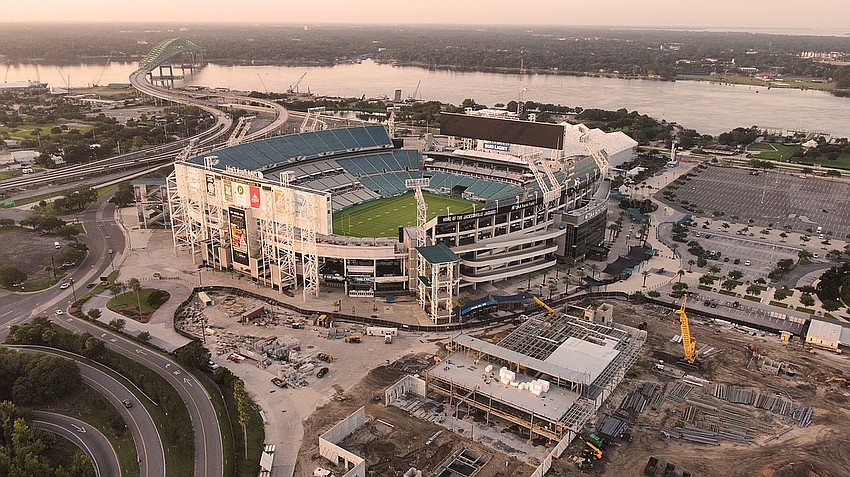
Q: You’ve said you intend on bringing in an outside negotiations team to negotiate with Shad Khan and the Jaguars for the (TIAA Bank Field) stadium renovation. Who would you bring in for that and how would you finance the city’s portion of the investment for the improvements?
A: I think there are a number of people that negotiate with the NFL on a regular basis. We would bring in the best negotiators. I don’t have a name for you right now. But we are going to bring in the people who do that work.
You know, frankly, I just think that to have the same person who brought us Lot J as a great option for our city to negotiate that deal is really probably not the best thing for us.
I think we need to make sure we’re bringing in the people that are used to dealing with the NFL. That’s what I’m talking about when I say you bring in the best people. No matter where they’re from, bring in the best people to negotiate that deal.
I will very intentionally also go after private money for this. I’m hoping we can build a lot of private investment in this. But I think it’s going to be a combination of private money, city money, Mr. Khan and the NFL. It’s going to be a combination of those things. For me to negotiate that here would be a mistake.
Q: So you want the NFL itself to have more buy-in, not just the city and Shad Khan?
A: I think everybody needs to have buy-in.
Q: Will the stadium remain city-owned?
A: I would like for the stadium to remain city-owned. I love the thought of being able to go after college playoff games and other uses for that stadium, using it for city purposes as well. You know, I think I understand the public sentiment about all this. I really do. I think that my job will be to get the best deal for the city, but also to go out there and listen to what folks are saying in the communities and try to make sure that we bring people into the process.
That’s true of anything with our city. If you can communicate with people, listen to them, bring them into the process and have everybody understand why you’re leading the way you’re leading, at the very least, there’s less confusion and there’s less feeling that there’s a wall between us in and them.
Q: You often mention, including in this interview, that infrastructure is one of the pillars of your campaign. What projects would be your priority, and how would you pay for those without raising property taxes? You mentioned federal grant funding. That may pay for the project, but there’s long-term maintenance costs as well. How would you pay for that?
A: Well, look, I think I’ve already mentioned that the septic tanks are a priority for me. I think that’s a very big deal. Drainage, obviously a very big deal. We’re going to have to invest in resiliency in this city. That’s a very, very big deal.
I’d like to make trees included in the definition of infrastructure because they’re going to play an enormous role in terms of protecting us from that extreme heat that’s coming. Also, if we can replace some of these big asphalt surfaces with green surfaces, I think that’s going to be another very, very important thing in terms of controlling floodwaters. So all of those things are very important.
But then I also I love what we’re doing with the Emerald Trail and I love what we’re doing with the riverfront. That’s going to play a key role both in resiliency and in bringing more people Downtown. So all those things are very important to me and on priority lists for me.
Q: What specific federal grant programs do you think some of these infrastructure projects would qualify for? Are there sources you’re already looking at?
A: I have reached out to a number of different grant writers who work with other cities, who have told me literally that we leave hundreds of millions of dollars on the table. And frankly, I’ve talked to people within our city government, whose names I can’t use because they’re worried about retribution, who have said the same thing. We leave hundreds of millions of dollars on the table.
Our federal government right now has very much prioritized infrastructure projects and also resiliency projects. There are so many different grant opportunities. But it’s not just in those areas. From the conversations I’ve had, there are so many different sources that we could go to bring down that money, and I just don’t know why we would leave any stone unturned when it comes to being able to fund our city.
Q: Why has that not happened?
A: It hasn’t happened primarily, Karen (Mathis), because it’s been a political, philosophical difference. We don’t like who’s in the White House or we don’t believe in federal dollars. My feeling is that these are our tax dollars. Why would we not bring them back to Jacksonville and put them to work for us?
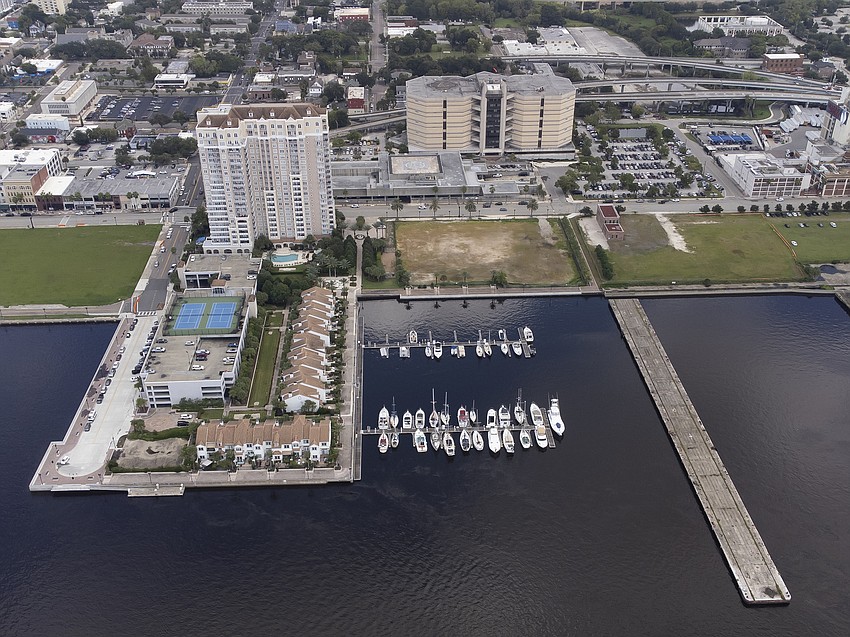
Q: What do you support about the city’s current economic incentives policies to attract private businesses? How would you change the way City Hall incentivize companies and developers?
A: I think REV grants (property tax refunds) are good. I like those. I don’t really think that upfront money is a really great idea. But I like the idea of giving completion money. That that makes sense. Like I said, the biggest issue that I have right now is that we seem to kick the can down the road on things that we can do to mitigate how much incentive money that we bring in.
I remember having a very long conversation with the former mayor of Tampa, Bob Buckhorn. And we talked about infrastructure being such a priority and he said, ‘Honestly, Donna, I think it’s so important that that’s your first pillar, because if you take care of the public infrastructure, you’re not going to have to give away so many incentives.’
So I think that’s the biggest thing. Let’s take care of what city government is supposed to do. Let’s check the boxes that we should be taking care of. And then some of those things will take care of themselves.
Q: In general, how do you see the mayor’s role in economic development?
A: Well, I think I’ve talked a lot about that. I think the mayor’s role is first of all to lift people that very often are neglected. I think that’s very, very important. The good news, even for the folks who are getting everything right now, is that when we bring more people into this economy, they’re going to do better too. So the idea is just to bring more money into the economy. So I think what I can do is I can use my voice and go out there and make sure that I’m talking to the business community, to the neighborhoods, about things that we can do together to move us forward as a city economically.
I will tell you when I go out, and I’ve been talking to different community groups and neighbors and having town hall meetings for a year and a half, what people have said to me over and over again in these neglected communities is we don’t really even understand what is available to us. We don’t get it. Because nobody’s talking to us about it.
And when I got into this campaign what I said is there’s absolutely nothing ailing this city that political will can’t fix. And I think it simply is, let’s make sure that we are creating the educational opportunities to connect people to the levers that will allow them to succeed. We could talk about CRAs or business investment districts that might be something that appeals to some people in some of the neighborhoods that feel like very often they don’t get to keep their tax dollars. I just think there are all sorts of options if people are simply educated about what’s available.
Q: You appear to support the Downtown Investment Authority’s riverfront parks plan. What’s your overall opinion of the DIA’s strategy for Downtown development?
A: I think that it’s hard for me to judge everything about it because I feel like DIA is very much connected to what the mayor’s vision is. And I think it’s very hard, from what I understand from everybody I talked to at the city, it’s extremely hard for anybody to color outside those lines. I would really love to see what would happen with new leadership. But one thing I will say is, I don’t want that to become an independent agency. I think it needs to remain like it is. I think the accountability is much better when we leave it in its current structure.
Q: How would you utilize the DIA to move your vision forward for Downtown development? Is there a specific focus you want the agency to have?
A: I just want a more intentional strategic plan. I really do. If you look at how our city was constructed and what happened with our master plan from 1971, when we basically created this big loop system around the city and streets that aren’t two ways and all these things, if we are going to very intentionally create development that creates neighborhoods that are more navigable on foot and by bicycle and have the amenities that we want and all of those things, there’s got to be a blueprint for that.
That would be my intention. Let’s finally go ahead and make these streets two ways. I really don’t understand why that’s taken so long. Let’s make sure that we are intentionally creating a full blueprint that will allow us to create the type of downtown that we want.
Q: What about the jail? Will you move the jail from Downtown in your first term? And if you do, how would you pay for the expense? Some estimates are upwards of $400 million on relocating that facility.
A: I toured the jail a few months ago and talked with the folks who work there. They’re really understaffed. They need more folks. The jail definitely is an antiquated place and not large enough for what we need, unfortunately. I don’t see that happening in the first year. I really do not. There’s just so much going on. We’re going to be having to look at a stadium deal. We’re looking at all sorts of other priorities, For me, it would not be a first year priority.
Q: Would you look at that within the first four years of your administration?
A: We’d have to look at it.
Q: What is the city’s role in bringing more affordable housing to Jacksonville? How would you convince and incentivize developers to build more affordable housing and landlords to keep rents affordable?
A: I think that we have to be focused on this issue because we’ve kicked the can down the road on it for so many years. There are so many cities of our size that have invested so many millions of dollars into affordable housing, and we just really haven’t. So we need to do that.
I think there are some wonderful organizations doing good work. Ability (Housing) is a fantastic organization. There are other organizations that I know are doing a lot of work in affordable housing, but I think infill is a really, really important part of that.
And just going into those areas that already have infrastructure, and let’s change the zoning so we can have a more high-density building there. I think that will really help. I think incentives are important, but I think we have to say to the folks who want to build, look, you have to set aside some of those areas for affordable housing.
And there is a difference between affordable housing and workforce housing. Affordable housing is a lower threshold than is workforce housing. You need both of those things. So I’m for providing incentives for that. But I think we also just have to really increase the inventory and I think that will help as well.
Q: I sounds like you’d support requirements to keep a certain number of units in developments for affordable or workforce housing, is that accurate?
A: If they’re going to get city incentives, yes.
Q: Bond debt and cash incentives that have been previously awarded by the city to developers and companies, they’re going to start coming due in the next 10 years. They could put more stress on the city’s general fund. How would you ensure that the city is able to pay its bills while keeping capital project investments steady?
A: I think I’ve talked a little bit about that. We talked about this when we were on the forum the other night on Channel 4 (WJXT News4Jax) and (Florida Times-Union columnist) Nate (Monroe), looked at me and said, ‘So we’re just going to bring federal grants in for everything.’ And I said, Look, you really have to look out, you can’t just plan for the next day. What we’ve done so often in this city is we have been reactionary to things. I think we have to change the structure of how we bring in dollars. We’re not going to raise taxes on people.
People have been through a difficult time in this city. People have been through a difficult time in the state of Florida. But what we have to do is we have to change the structure of how we bring down dollars. I’m not going to limit what we can do on that front. So to me, that’s a big answer.
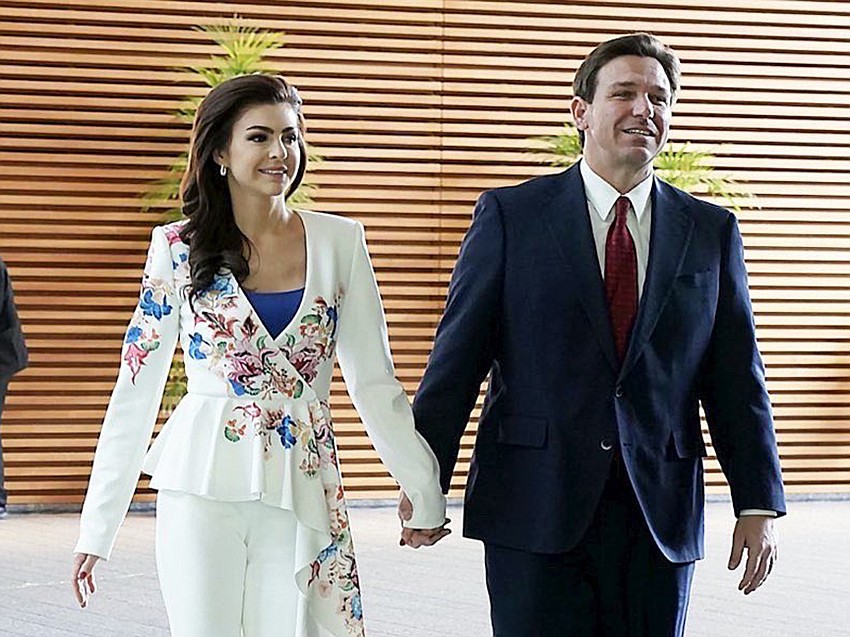
Q: You started to touch on this, but if you’re elected, you’d be a Democrat working with, likely, a Republican majority City Council. How would you get your agenda and your budget priorities passed? How do you envision your relationship with City Council?
A: The same way that I’ve conducted myself in 25 years as a news anchor and in making sure that I listened to every single person that I am speaking with and bringing their voice into the room, the same way that I built a nonprofit from the ground up and for 20 years, made sure that we had a successful team. You have to bring the right stakeholders into the room and you have to listen to everybody. It can’t be hyperpartisan.
So, I would do the same thing I’ve always done. I’m a good relationship builder. But what I do with those Council folks is I’d say let’s find a win for you. What is happening in your district that we can bring into this process that would be helpful.
And I honestly believe that very often, and I’ve had this conversation with other mayors, a city will take on the personality of its mayor. And my personality is that of collaboration. I’ve always been that way. I have a huge love for this city. I also see value in everyone’s opinion, whether it’s my opinion or not.
You don’t move anything forward by always listening to your own thoughts or hearing your own opinion or surrounding yourself with people who agree with you. So I would surround myself with a team of rivals. I think that would be really important.
Q: Navigating hyperpartisanship at a local level is one thing. How would you handle the influence of Gov. Ron DeSantis in city business? Sometimes he does speak out on local issues and puts pressure on using his bully pulpit.
A: Oh, listen, I think that so much of what goes on in politics is political theater. It really is to move a dial, right? I used to work with the governor’s wife (Casey DeSantis). I know the governor. I have absolutely no problem working with him. I’m a bit concerned at the erosion of local rule we’ve seen out of Tallahassee recently. I would love to have that conversation with him.
A comment was made recently by a top Republican that really the only thing that a mayor should be allowed to do in a city is to pay the bills. I think we need to be able to do a whole lot more than that, because the city of Jacksonville has a proud tradition of local rule, and I would hate to give that away to anybody. But those are the types of conversations we’ll have to have.
But I have every confidence that I can work with the governor in all the ways that I need to. The alternative is to continue doing what we’re doing, which is a supermajority of one-party rule. That is not working for us. And so we need to make sure that we are taking steps toward more balance.
Q: As mayor, you would be working with (JAX) Chamber. And because Daniel Davis is president of the chamber, if he remains there, how do you see that relationship?
A: Well, look, Karen (Mathis), I have run a very positive campaign. (I) haven’t said a whole lot of negative things about my opponent beyond just calling him on his record in forums. He has run a scorched earth campaign that has, frankly, put out a whole bunch of lies and disinformation about me. So I would suspect that he would have a whole lot more trouble looking at me than I would have him. But I don’t have any worry that I can work with the chamber. I know a lot of people within the chamber. I know the folks on the executive team on the chamber. Just like everything else, when political season is over, we will do the things that we need to do to make Jacksonville work.
Q: You talked about workforce development, and you know that the school system is a big provider of employees. With all the changes that are taking place in the school district and the (Duval County) School Board and with our superintendent, how do you see your relationship as mayor with the school district?
A: I’m a huge advocate for public schools. I think we have got to be a better partner to our public schools, but at the end of the day, that is an independent body. I will do everything I can to lift the voices of our of our public educators. I’m going to focus extremely intentionally on literacy because we have a 47% literacy rate in our city. And I think that’s something that I can do to be a good partner to our public schools.
If we can help build public-private partnerships to lift that literacy rate, that will do everything in the world to help our workforce development because 70% of the folks in our jails are illiterate. If you can make sure that a child is reading by the time that child is in third grade, then that child very, very likely is going to be successful. So, I think that’s a way in which I can be a good partner there.
Q: You’ve been very available to the public and to the media. What do you see as a mayor that your presence would be on social media and in person?
A: I’m going to continue to be very present. I have told people every time I’ve had a town hall or attended a community meeting that I will continue to do that as mayor. I’m going to have access for people to come to me in the mayor’s office. That doesn’t happen very much right now. I think that it’s hard to argue to people that you’re going to show up for them if you don’t show up for them during the campaign. I think you campaign like you lead and you lead like you campaign, so I will leave people to judge between myself and my opponent how we would lead the city that way. But I look very, very much forward to bringing people into City Hall and to being a part of this community just like I am now.
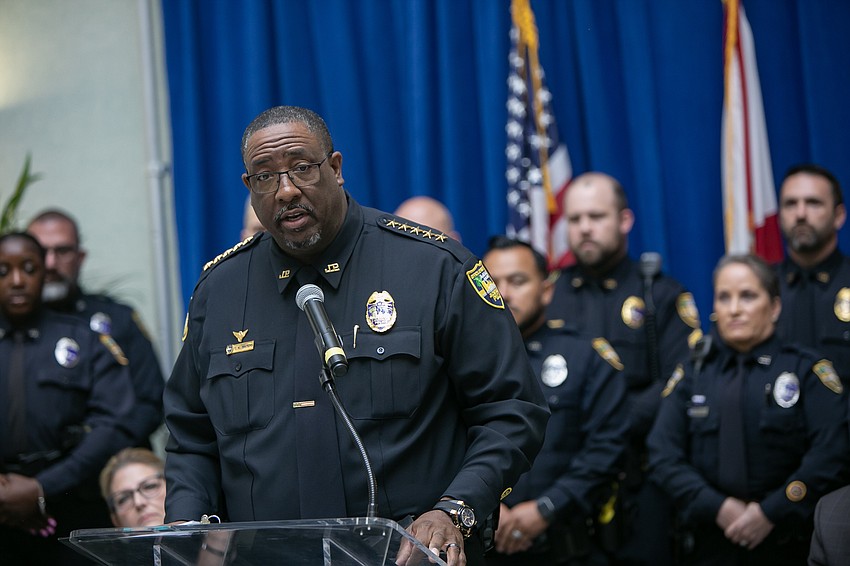
Q: One of the issues that continues to come up during the campaign is public safety and the relationship of the candidates with the sheriff. What is your relationship with (Jacksonville Sheriff) T.K. Waters?
A: Well, T.K. Waters has, at this point, really acted more in a political fashion by endorsing Daniel Davis. They have the same political consultant. It’s not a surprise that a Republican sheriff would endorse a Republican candidate. This has happened from time immemorial in Jacksonville.
But what I would say is I am anxious to work with the sheriff. When I sat down with the FOP (Fraternal Order of Police), when I met with them during their interview process, I said, look, I know who you guys are going to choose. And I know you’re going to call me everything but a child of God in this election cycle and you also know it isn’t true.
I have always worked with police. I am very anxious to find the extra police officers that we need. We have to have more police officers on the streets.
I will also make sure that our police officers are accountable to our community in that I believe it’s important to have more community engagement. A lot has been made in the civilian review board issue. But we have 11 of those in the state of Florida, Some of them (are) in very, very conservative counties like Sarasota, and they’ve seen a 15% decrease in arrests of Black citizens. They’ve seen an increase in trust between police and citizens.
In 2017, the Florida Supreme Court said you cannot have a citizen review board that has any authority over police. So that was never an issue. And when I met with the FOP, I said that. I said look, I’m not looking to do anything that would take away your autonomy. All I’m looking to do is increase communication between police and the community. That’s what I want because that makes us safer. And I said ultimately, both of us wants safety.
I was very grateful to see former Sheriff (Nat) Glover come out and say let’s not make this an us versus them thing again. Let’s let’s work together to make a safe community. So, I really wish that we wouldn’t politicize these types of things. But at the end of the day, the sheriff has a job to do to make our city safer and obviously public safety is my top priority as mayor.
Q: Do you see any major increases or needs in the city budget at this point?
A: No, but I don’t know how to fully evaluate that until I get in.
Q: Because that would be a pretty quick turnaround.
A: Yeah, that’d be a pretty quick turnaround. I think that’s something that I’ll have to get in and take a look at when I get there.
Q: There’s been a lot of talk about possibly reinstating pension benefits for police and firefighters. Do you do you support bringing those folks back on to a pension program, and would that look like? What would the structure look like and how would you pay for it?
A: That’s a big issue. I’ have to go back to, initially, had we funded the pension properly to begin with, had it not been mismanaged to begin with, we would not have had the issue of this whole shift into the 401(k) system. I think that sounds great when you’re 20. Maybe not so much when you’re 60. What I’ve heard over and over again, from the folks in law enforcement and in (the) fire (department) is that this is becoming an issue for us in terms of retention.
So the first thing that we have to do is get some data on that. We have to evaluate, is that really a problem? Are we losing our best and brightest because people are now getting trained up and then go into someplace where they have a defined benefit?
I had a couple of different pension experts looking at this for a while. I’m trying to evaluate both what it would look like to return to a city pension plan and what it would look like to go to the state retirement plan. I think the state is looking like the better option if we were to do that.
But at this point, we’d have to figure out how can we do that without busting the budget. So it’s not something that’s going to happen immediately. But I think it’s something that we have to evaluate because at the end of the day, public safety is very, very important.
Q: You mentioned creating a chief health officer. The current administration created a chief resiliency officer. How would you see those roles in the hierarchy of your administration? What kind of authority do you see those types of positions having in a Deegan administration, given the fact that health and resiliency are two of your top priorities?
A: I would lean heavily on those folks that are running those departments. The chief resiliency officer, I think she’s coming out with a with a heat and flooding map in the summer, which is really going to help us to target where do we need to initially spend our resiliency dollars. But I think both of those positions are extraordinarily important.
In order to start to move our health numbers, and frankly, to put us in a position to where we are creating businesses, but that business owner doesn’t have to say, ‘Gosh, I’ve got my business but I’m sitting in the dark underwater on a street that nobody can get to,’ it’s going to be very, very important to lean on those folks.
Q: How would the chief resiliency officer in your administration impact policy on development? Would they be involved in building code decisions and those types of development processes?
A: I think it has to be a consideration. There has to be some weighing in there. And I think that’s, again, one of the big differences between how I would be leading as mayor and how my opponent would be leading. He is largely funded by the large developers.
And I think what you see over and over again in our current scenario is that we’ve never really met a development that we didn’t like. Look, I love development. I want to develop, but we have to develop in a smart way. So we’re going to have to create the codes that create where we can build and where we cannot build.
And we have to be led by resiliency, not from the development side. Because the truth is, if we don’t, we’re really going to be in trouble as a city. We are probably the most vulnerable city in the state of Florida on a lot of fronts.